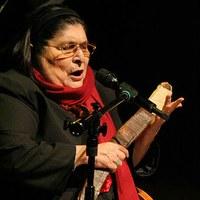Tucumán, 1935 – Buenos Aires (Argentina), 2009
By Ángel G. Quintero Rivera

One of the leading female voices of the Latin American Nueva Canción movement, Mercedes Sosa became known initially for her renewal of the folk expressions from northern Argentina. She soon distinguished herself with socially themed songs that would initiate the movement in the 1960s, as exemplified by the titles of her first two productions, Canciones con fundamento and Yo no canto por cantar. By 1967, she had performed in numerous countries, becoming one of the first exponents of the Nueva Canción movement to gain widespread international recognition.
Although two of her early productions paid tribute to the pioneers of folk music, Violeta Parra and Atahualpa Yupanqui, the Argentine singer maintained a broad repertoire within the Nueva Canción, interpreting compositions from the most prominent singers and songwriters in Latin America. Along this journey, La Negra, as Mercedes Sosa was called in the early stages of her career, became known from the 1970s onward as La Voz de América Latina (The Voice of Latin America). The singer also participated in productions by composer Ariel Ramírez (famous for his “Misa criolla”) and several films by Argentine filmmaker Leopoldo Torres Nilsson. Her innovative and rebellious spirit was also expressed in her performances with the most notable exponents of national rock in her country since the 1980s, such as Charly García and Fito Páez.


